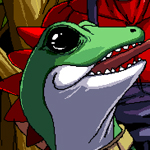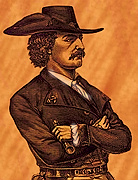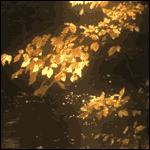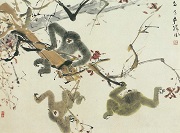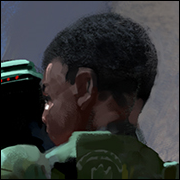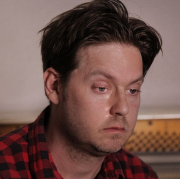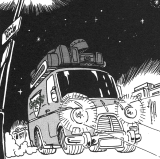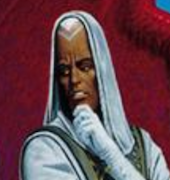|
I mean those books are not meant for teens, that was her point
|
|
|
|

|
| # ? May 1, 2024 19:43 |
|
ulvir posted:and it seems (based on the age of those who argue) that itís a competition for adult readership, and expecting to write a review for that, and instead getting handed books meant for kids and teens, must be really aggravating Ras Het posted:I mean those books are not meant for teens, that was her point Yeah, Railroad got a Pulitzer, for example. Normal People is a huge commercial and critical hit and got its own TV series. Crispin took aim at books that are widely agreed to be great literature (and not for teens) among the people who decide this sort of thing for the rest of us. Her broader point, and I'm not sure it's totally true* but it makes for a great Post, is that the popularity of YA books has changed popular taste in 'adult' literature to prefer simplicity and condescension. I doubt she was aggravated. Actually she was probably thrilled to get the chance to pan these two books in such a way that it would piss off the YA twitter militia. * It's demonstrably true that a lot of prizewinning literature is vapid, substituting overt political gestures and telegraphed allusions to better work for (e.g.) depth of characterization ó but I don't think that trend started with Harry Potter, and it's true of other media as well.
|
|
|
|
Harry Potter is weird about this. It is not a subtle work for sure, but what subtlety there is seems to go completely unnoticed by the Harry Potter fans, to the point that when Sirius says that the world can't be divided into death eaters and good people... but the Harry Potter Twitter fandom will not shut up about how whoever they don't like is Voldemort for the day because modern discourse absolutely cannot handle nuance. There is a healthy unsubtle critique that the Wizarding World's status quo is actually...garbage which is completely ignored, or that President Coin of the Hunger Games is also an awful leader with the same morality as President Snow and none of this is ever engaged with in favor of desperately smashing #resistance hashtags everywhere. These are hardly subtle points, but even then they are simplified so powerless Twitter users can feel like they're on a great crusade to destroy evil without ever leaving the house. It's not just a failure to read complex works, but a failure to engage with the minimal complexity provided in the work to begin with. I sure as hell don't want to see how these people would interact with, say, The Bridge over the River Kwai.
|
|
|
|
|
TheGreatEvilKing posted:I sure as hell don't want to see how these people would interact with, say, The Bridge over the River Kwai. the god news is that you never will, because adults who only read harry potter and YA will rarely read anything else (except maybe fanfics)
|
|
|
|
It's possible, from a suitably elevated position, to think everything anything deals with is childish and immature. It doesn't help that the prose is simplistic and devoid of nuance. Eventually you're just reaching for the things that tingle your specific brain type. The problem is it's hard to imagine anyone who's ever stimulated their neurons would find inspiration in some works. The other problem is people don't want to think when it comes to a lot of books; they don't want new thought, challenge, consideration, etc. This, then, butts up against the ludicrous notion people put across that all books, and any reading, is somehow this great intellectual endeavour. Me watching Parks and Rec isn't bettering my thought or ideas, the same should be said about these books. (Note I've only read Harry Potter and Normal People, not the other book mentioned.)
|
|
|
|
TheGreatEvilKing posted:I never did do the Rage of Dragons review, any interest?  I've been missing bad book takedowns from this thread I've been missing bad book takedowns from this thread
|
|
|
|
TheGreatEvilKing posted:I found your problem, and it's Twitter. yeah man go for it
|
|
|
Famethrowa posted:An Artist of the Floating World by Kazuo Ishiguro has been a pretty satisfying, and subtle, counterpoint to Mishima's lost-cause nationalism. Especially with Mishima's sainthood of late among the alt-right community. I wanted to go back to this briefly because An Artist of the Floating World is one of my favourite books and deserves a lot of love. Strongly recommend.
|
|
|
|
|
TheGreatEvilKing posted:I found your problem, and it's Twitter. Yeah. I read that book and while I wasn't expecting greatness, since it was originally self-published, I felt it squandered a lot of the flavor a non-European centric fantasy world could have. Aside from names and building materials, everything is traditional fantasy. The main thing to recommend it is the pacing, it will keep you reading, but when you're done you haven't really learned anything aside from being really persistent can accomplish things.
|
|
|
|
Beefeater1980 posted:I wanted to go back to this briefly because An Artist of the Floating World is one of my favourite books and deserves a lot of love. Strongly recommend. Is there a particular translation you recommend? Also the Amazon reviews for this are a treat quote:
quote:Thought provoking quote:jkl
|
|
|
Heath posted:Is there a particular translation you recommend? Hell, I like that book, and I mostly read fantasy. But I guess Ishiguro is pretty accessible in general. anilEhilated fucked around with this message at 19:38 on Oct 26, 2020 |
|
|
|
|
Wow they found a book about an old man shuffling through his twilight years in a liminal state of pre and post war Japan...aimless? What absolute critics they are. 
|
|
|
|
As mentioned above itís originally written in English: Kazuo Ishiguro (technically Sir Kazuo Ishiguro OBE and some other letters) is a UK writer who happens to be ethnically Japanese.
|
|
|
|
|
The Rage of Dragons The Least African African Fantasy Interview with the Author* posted:Is your worldbuilding based on any research you had to do for the book, and if so, what did you have to research? The Rage of Dragons is a title suggested by the thread's discussion of young adult fiction and how modern fantasy is swiftly collapsing in complexity. The central conflict of The Rage of Dragons is one man's struggle against an unjust caste system, which is solved not by the protagonist's character but by the protagonist's ability to go down into the spirit world and grind mobs to become a level 99 swordsman. That sounds like a joke, but unfortunately, that is in the text. Tau Solarin starts the book as a would-be draft dodger, until the evil noble Odili has his father killed in a duel. Tau decides that instead of injuring himself to sit out the eternal war against the the natives his people colonized, he is going to become the greatest swordsman of all time by practicing really hard until he can slay all the evil nobles in single combat. Unfortunately for our intrepid protagonist, he lives in a world where European "scientific" racism is real and grants the eugenicists magic powers, and here our troubles begin. This is a vaguely "African" fantasy world, and I include African in quotes because neither the imagined Omehi culture nor the fantastical elements of the narrative are in any meaningful way African in the slightest. The Omehi culture has ranks such as "Indlovu" - which is their noble warrior caste, but is traditionally an honorific reserved for Zulu kings. The ultimate irony is, of course, that the word translates to "elephant", but there are no elephants to be found in the novel, not even in the legends told by the characters of the pre-colonial era when animals weren't extinct. The fantasy elements are taken directly from Dungeons and Dragons. The titular dragons are the standard European fire-breathers. Sorcerers are split into Enervators, Edifiers, and Entreaters with all the nuance of selecting a character class in Dungeons and Dragons. Dungeons and Dragons 3.5 SRD posted:Enervation "Enervation" is a type of magic used by the characters. The Rage of Dragons posted:"We are of royal blood. Royal blood runs closest to the Goddess. We have greater gifts than all others. When we saw the danger to you, we used a type of enervation. Queen Taifa, though not the first to use this particular gift, named it 'expulsion'. With it, we can forcibly remove anyone, including those holding energy, from Isihogo." Unfortunately, this is not the only time the text descends into the language of video games. Characters "blast" and "shoot" their swords - indeed, the word "blast" is used so often that one imagines one could easily make a drinking game out of it. Tau, we are repeatedly told, is of average strength with no talent for combat - yet after grinding enough levels in the underworld he is able to casually dent solid bronze helmets with sword strikes and withstand being thrown into walls by gigantic cursed warriors. This is all told in a mix of video game terminology combined with Winter's overuse of adjectives and love of passive voice. quote:This put Tau on the defensive, and the extra attention needed to dual-wield was taxing. The sheer lack of imagination combined with dull prose cannot be overemphasized. Here is how Winter describes a dragon attack. The Rage of Dragons posted:His vision swimming, Tau looked up and saw his first dragon up close. The behemoth, its body a mass of pure-black scales that drank in the light and twisted the eye, ripped through the air. Tau watched it course toward the hedeni, sinuous tail trailing behind, lashing the smoke from Daba's fires to hazy shreds. In context, Tau is a young man who has never seen war, and is currently going through a crisis of conscience having just killed an enemy in battle - yet the narration spends more time telling us the dragon is black than it does the effects of presumably horrifying dragon fire. Let's compare this to Tolkien's burning of Lake Town. The Hobbit posted:Roaring he swept over the town. A hail of dark arrows leaped up and snapped and rattled on his scales and jewels, and their shafts fell back kindled by his breath burning and hissing into the lake. No fireworks you ever imagined equalled the sights that night. At the twanging of the bows and the shrilling of the trumpets the dragon's wrath blazed to its height, till he was blind and mad with it. No one had dared to give battle to him for many an age, nor would they have dared now, if it had not been for the grim-voiced man (Bard was his name) who ran to and fro cheering on the archers and urging the master to order them to fight to the last arrow. Tolkien's prose evokes the movement of the flames and the clash of elemental forces. The hail of dark arrows is repelled by Smaug's fire. Winter's nameless dragon is silent, Smaug's breath hisses against twanging bowstrings and shrilling trumpets. Tolkien's fire is in motion lighting the lake and burning the town, Winter's dragonfire is merely a visual spectacle where some men and women happen to die. Make no mistake - the Rage of Dragons would have us believe that the titular dragons are so evil and dangerous they poison the land and keep the characters trapped in an eternal war, but Winter does not have the prose skills to pull this off. It is tempting to stop there, but unfortunately there's more. Evan Winter Interview posted:I can see why. You describe your book as Game of Thrones meets Gladiator on Arrakis. That could be heavy stuff for his age. Were these works, including Frank Herbertís Dune, major influences on the book? The influence of Game of Thrones may be found in the Omehi caste system. Tau is a commoner, specifically a "Lesser", who spends his time training his sword skills to kill the nobles who murdered his father, and the caste system is where the book falls apart. Much like in Game of Thrones, the nobility are power-hungry parasites who trample the commoners and murder them for sport. Unlike Game of Thrones, which is clear that the nobility is not inherently superior to the commoners, Winter sets up a society where the nobility is the result of deliberate eugenics, and this is where things begin to go very wrong. In Winter's setting, eugenics actually works. The nobility all are inherently stronger and faster, not because of getting the best food or because of having free time to exercise, but because of eugenic practices that give them magical powers. The children of nobles and commoners are killed so as not to dilute the magic bloodline, and the nobles use "Blood will show" as their battlecry to drive the point home that this is an evil caste system based on eugenics. Tau is described as an average man with "no talent" for combat who excels because he works hard. Ignoring the contradiction that many talented people acquire this status by...working hard, the superior human speed and strength created by the nobility's eugenics program is portrayed as an insurmountable advantage such that Tau cannot overcome a similarly skilled opponent. This seems like something that could be overcome by cleverness, but unfortunately Tau is a hotheaded idiot who is constantly screaming at nobles who could have him executed that he is going to kill them before some other - usually noble - character intervenes to bail him out. There is no intelligence here, but we expect Tau to prevail - how will Winter solve the problem? The answer is to have Tau descend to the underworld to level grind off of demons, something anyone theoretically can do but no one thinks to do before Tau's hot sorceress girlfriend tells him about it. This is supposed to send the message that persistence can overcome your opponent's natural abilities, but it unfortunately serves to reinforce the subtext that the eugenicist's advantages are insurmountable when both sides are equally trained and dedicated. Tau overcomes not because of his inherent ability, but because he has the favor of the sorceress who can give him knowledge even the noble class doesn't have. The more one examines the caste system, the less sense it makes. The commoners universally despise the nobility and start screaming about equality at the first opportunity...despite the fact that when we look at real class systems, many of the lower class are complicit in their own oppression (see: White Tiger and the rooster cage). The nobles have powerful political systems and a military designed to preserve their own power, but Tau is able to show up to a royal event fully armed and evade the guards with no consequences whatsoever. The caste system reminds one less of George RR Martin's nobility and more like the easily collapsible dictatorship of the Hunger Games. Like the dragons, the nobles - despite having vaguely African names - resemble European psuedoscientific racism more than African political structures. Compare this with Black Leopard, Red Wolf - while Marlon James' novel is decidedly unpleasant due to things like the previously mentioned piss rape hyenas, James actually has a command of prose and African folklore. James' mythical creatures and witches stride boldly out of legend, and James conjures a dreamlike quality for his novel that reflects poorly on Winter's particle effects. The Rage of Dragons is supposed to be African fantasy, but as written it would be trivially easy to swap out the African names for European ones and no one would bat an eye. I can think of nothing more damning. In conclusion, The Rage of Dragons is a perfect example of the lack of complexity found in commercial fantasy authors. Here is Tau. He is an oppressed commoner. Here are the bad men, who are evil eugenicists. Look, it's set in Africa! It's different, but not different enough that readers will be forced to think or left with anything to chew on. Look, a wizard! Look, a dragon! Look, another attempt to resolve the genre's obsession with blood purity and eugenics! This is not a work of literature, this is a fish tossed to nerds so they can clap like trained seals while the publisher laughs all the way to the bank. * Interview may be found at https://www.lightspeedmagazine.com/nonfiction/interview-evan-winter/
|
|
|
|
|
Thanks for the write-up! I can't get over how generic the title is. It feels like a lot of books are doing that sort of 'It's the thing you like, but different - but not so different as to be scary!' It was a thought I had when reading Muir's Gideon the Ninth, which had an interesting beginning that abruptly turned into a fairly paint-by-numbers YA plot. It was also interesting because I thought of this thread when I read if, if only because I believe that Gormenghast - a book BotL held in high regard - was mentioned as an influence.
Milkfred E. Moore fucked around with this message at 13:08 on Oct 29, 2020 |
|
|
|
|
I keep confusing Rage of Dragons with the Dragon Republic, another recent, popular fantasy book that I assume is very bad. Did someone in this thread review the Poppy War, or am I misremembering? I have many issues with that book that I find really hard to put into words. If no one has, I might take a second look at it, even though that would mean rereading it.
|
|
|
|
What is it with fantasy novels in particular always being directly compared to whatever work they're derived from? If I wrote a novel and someone compared it (even favorably) to Lord of the Rings or Hunger Games or whatever I'd be pretty upset about it, personally.
|
|
|
|
Heath posted:What is it with fantasy novels in particular always being directly compared to whatever work they're derived from? If I wrote a novel and someone compared it (even favorably) to Lord of the Rings or Hunger Games or whatever I'd be pretty upset about it, personally. every work of literature has compared to its antecedents, constantly, since time immemorial, so if that makes you upset get therapy i guess
|
|
|
|
Bonaventure posted:every work of literature has compared to its antecedents, constantly, since time immemorial, so if that makes you upset get therapy i guess That's not what I meant and you know it. I'm talking about how every fantasy novelist who gets interviewed has their work described as some variation on the phrase "[popular series] meets [popular series] with a little urban fantasy thrown in" as a matter of course, not a comparison of work or technique but as a shorthand for borrowing the window dressing of other work in the genre. It's such a standard practice that it very often shows up quoted on the book cover and has the result of corraling the ecosystem of fantasy within marketing columns. If you like Hunger Games, you'll like this! Etc. Nothing like comparisons of the actual writing but merely the broad themes of the book for the benefit of the idle shelf-browser.
|
|
|
|
Because they're trying to sell their books, and drawing a connection with popular, best-selling books is an effective marketing strategy.
|
|
|
|
PeterWeller posted:Because they're trying to sell their books, and drawing a connection with popular, best-selling books is an effective marketing strategy. Thanks, I didn't understand the thing I said until you rephrased it. The problem for me is the idea of ostensibly trying to be an artist but the entire genre is so saturated with the concept of derivation that you're not even allowed to attempt to escape from being derivative. I'm not trying to advocate an impossible total originality, but the implication that I have perhaps just re-written Game of Thrones-but-Africa-flavored would cheapen the contributions to and of my own work. And the comparisons are never like what TGEK did above in taking a section of Tolkien that also features a dragon attack and contrasting the actual technique of the writing, it's always something like "your novel features a corrupt and oppressive nobility. It has been compared to Game of Thrones, which also features a corrupt and oppressive nobility." It's intellectually insulting to both the author and the reader, and yes, I get why it's like that in the most reductionist it's-capitalism-stupid sense, but I presume there are at least some seriously-minded writers out there who would like to write a genre book but feel put off by the notion that anything they write is going to get slotted into a category titled by some book series that happened to sell very well a decade ago, whatever the reason. I am not literally saying I don't understand the state of things, I am asking rhetorically why it has to be that way for the sake of discussion. It is embarrassing that I have to state that explicitly in the loving reading forum.
|
|
|
|
Heath posted:If you like Hunger Games, you'll like this! Etc. Nothing like comparisons of the actual writing but merely the broad themes of the book for the benefit of the idle shelf-browser. people who read these kinds of books don't generally care about the actual writing, but care a lot about the broad themes, that's why they are focused on so much. 'it has a dragon!!!' or 'it's like GOT!" is all it takes for many fantasy fans who just want more and more of the same things that they enjoyed previously. there are huge threads on this very forum of genre people saying it's stupid to care about the quality of prose, and that only the story matters. of course there are exceptions but marketing is not aimed at exceptions.
|
|
|
|
This is a discussion forum. Questions will receive answers. Demonstrate some genre awareness. Now, obviously, these authors and writers don't find the comparisons as insulting as you think they should. If you listen to writers like Bob Salvatore, many genre writers don't see themselves as artists. They don't look at their writing as artistic expression so much as they look at it as the job they do to make a living. That doesn't mean they are not seriously-minded about their work. They understand that writing a work of genre fiction will invite comparisons, however shallow, to previous works. That is, after all, the basis for defining and establishing genres. A lot of them are probably quite happy to hear their work described as "X meets Y" because that's exactly what they set out to create. There are genre writers who speak out against this. Margaret Atwood is an example. And there are many works full of genre markers by *literary* authors that don't receive this treatment because the author does not publish and market their work as genre fiction. Consider Chabon's Gentlemen of the Road, McCarthy's The Road, or Ballard's The Drowned World for examples.
|
|
|
|
I feel that comparisons are mostly a product of mass market focused advertising (or publishing or even planning). And occur in all media. You can describe your work without using comparisons if you want to. But that requires the usage of technical vocabulary which limits your audience to a niche market, even if they understand the words they do not think that analyzing their own tastes so that they can vocalise what specific aspect of their favourites makes them their favourite is worth the effort. If you want someone who doesn't think deeply about books/music/games/movies to be truly impacted by your marketing "like the other things you liked" is much more effective then a technical description.
|
|
|
|
I have some writer friends who have been sending manuscripts to agents lately, and my understanding is that "X meets Y" comparisons are considered a basic and necessary part of query letters, as a shorthand for marketing your book. No writers I've talked to actually like them, but they're a necessary evil.
|
|
|
|
the "x meets y" requirement is 100% true and universal pitching your work and what publishers do to market generally isn't the same though
|
|
|
|
Part of my third draft process for this manuscript has been making it more x-meets-y for the benefit of pitching and lazy people (It's The Boys meets The Expanse. We're talking high literature, people.)
|
|
|
|
|
i wonder if we could find a common genre ancestor by tracing all the x's and y's of the 'x meets y' statements backwards. what 'x meets y' was game of thrones composed of when it was pitched? and what were those parents composed of? how far back could you go
|
|
|
|
derp posted:i wonder if we could find a common genre ancestor by tracing all the x's and y's of the 'x meets y' statements backwards. what 'x meets y' was game of thrones composed of when it was pitched? and what were those parents composed of? how far back could you go
|
|
|
|
Heath posted:Thanks, I didn't understand the thing I said until you rephrased it. "African Game of Thrones" was the pitch for Marlon James "Black Leopard, Red Wolf" despite being nothing like it (well, other than the immense amount of sexual violence). It might be slightly worse in genre, but it plagues all book covers. Can't have an Irish writer who isn't compared to Joyce for example. It is indeed maddening with how rarely it's accurate. Comparing a book to Infinite Jest in print ought to be punishable by the stocks.
|
|
|
|
ultrachrist posted:Can't have an Irish writer who isn't compared to Joyce for example untrue
|
|
|
|
Lex Neville posted:untrue i don't have the physical copy but there is no mention of joyce on the amazon page of strange hotel (the most recent book by an irish author i've read) and no 'x meets y' nonsense either. in fact looking through the books on my shelves i can't find much examples of this kind of thing at all, not on the physical book anyway, although a few of them have review quotes that say some variation of 'best thing since x' for example, on the back of my copy of melancholy of resistance is a quote from sebald saying that 'its vision rivals that of gogol's dead souls'
|
|
|
|
x meets y is endemic to the KU self-publishing crowd but there it's just a cheap way of trying to drive keyword searchers to your books. it's also a way of getting around negative thoughts about 'plagiarism' or being 'openly derivative of' by winking at the audience.
|
|
|
|
derp posted:i don't have the physical copy but there is no mention of joyce on the amazon page of strange hotel (the most recent book by an irish author i've read) and no 'x meets y' nonsense either. in fact looking through the books on my shelves i can't find much examples of this kind of thing at all, not on the physical book anyway, although a few of them have review quotes that say some variation of 'best thing since x' for example, on the back of my copy of melancholy of resistance is a quote from sebald saying that 'its vision rivals that of gogol's dead souls' yeah also, before, i meant that in pitching literature the x meets y is pretty standard. in pr much less so
|
|
|
|
In my experience in "literary" latin american literature, it's less "x meets y" and more "The next [insert famous literary author]" or "breaking new ground in [insert literary genre]" 90% of them are just long drawls about the ennui of the upper middle class and they wonder why people buy the books with a dragon
|
|
|
|
Pacho posted:the thing that 90% of people who don't read literature say to describe literature
|
|
|
|
Pacho posted:In my experience in "literary" latin american literature, it's less "x meets y" and more "The next [insert famous literary author]" or "breaking new ground in [insert literary genre]"[/spoiler] same thing really
|
|
|
|
Bingo Cop Metis posted:Did someone in this thread review the Poppy War, or am I misremembering? I have many issues with that book that I find really hard to put into words. If no one has, I might take a second look at it, even though that would mean rereading it. I had wanted to read it but upon skimming the excerpt it feels like another fantasy novel that has too many fantasy names and jargon which makes it a struggle to get into. Certainly not all fantasy works are like that, and sure that those that are more rooted in cultural context that's more familiar to the reader have an unfair advantage (with urban fantasy having the lowest barrier of entry), but it does seem harder to get into.
|
|
|
|
So the newest Stormlight book apparently came out recently, and my friend was recommending it. He gave me a reveal that was basically a plot summary, and the entire plot seems to center around not a clash of ideas but a bunch of people desperately trying to find sweet loopholes for their RPG style magic systems. It was pretty telling that we couldn't remember anything that happened in the previous book, and the experience left me convinced that the appeal of these books is encouraging readers to come up with their own sweet exploits to do 99 million damage. That said, this is all hearsay but I'm not in a rush to read this thing.
|
|
|
|
|

|
| # ? May 1, 2024 19:43 |
|
Well, I mean, that's basically what all of Sanderson's work is. It's precisely the experience that his readers are looking for - YA For Gamer Boys, and systems mastery is just one of the components. For some reason, the readership doesn't get that the author is just making it all up as they go along. The idea of a story based around exploiting loopholes in a system just strikes me as a waste of time when the author is also the one making up the system. It's like cheating at a game of make-believe.
|
|
|
|






